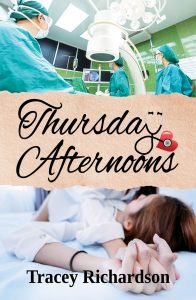 I’m a fan of reading medical romances, but for a long time, as a writer of romance novels, I was too scared to attempt to write one. Too intimidated, more like.
I’m a fan of reading medical romances, but for a long time, as a writer of romance novels, I was too scared to attempt to write one. Too intimidated, more like.
There are medical professionals with more than enough street cred out there writing successful medical romances. So why should I attempt writing them when I’m not a doctor, nurse, paramedic or even an employee at a hospital? I mean, isn’t it a bit “fraudulent” to write these kinds of novels when you’re not “one of them”?
Well, my answer is an emphatic no to that last question, since I’ve now written four medical romance novels (including two that were finalists for the Lambda Literary awards…the most prestigious award for LGBTQ books in the world).
A couple of things propelled me past my fears. And they can work for you too if you’re not entirely comfortable with writing what you don’t know. Look at it this way. Do you have to live through a war to write a novel set in a war zone? Do you have to be a cop or a victim of crime to write a mystery or suspense/thriller? No. What you do need to do is a ton of research, be passionate about the subject you’re writing about, and be prepared to work hard. If authors only wrote books based on what they’re personally an expert on, well, there wouldn’t be very many books out there. Or at least, not a lot of good books.
In my opinion, good writing is a skill that surpasses expertise on a particular subject. You can gain enough expertise to write a credible medical romance, trust me (or war novel or crime novel), but good writing is much harder to acquire skill. Be sure that you REALLY want to write this book of which you are a non-expert, and then do it.
What really helps me is to make my novel about the people wearing the lab coats and stethoscopes. It’s the people we, as readers, want to get to know and appreciate. We want to see that they’re real people with real problems and real dreams. Yes, you need enough medical jargon and medical scenes to show your characters (accurately) in their jobs, but mostly, keep it about the people.
 During my many years covering health news for a daily newspaper, I got to interview dozens and dozens of people in the medical field — everyone from those in the highest levels of government overseeing health care, to doctors and nurses, to the people who volunteer at hospitals and to those who mop the hallways. This allowed me to see these folks as people first, which then magically stripped away the mystique (and the intimidation!).
During my many years covering health news for a daily newspaper, I got to interview dozens and dozens of people in the medical field — everyone from those in the highest levels of government overseeing health care, to doctors and nurses, to the people who volunteer at hospitals and to those who mop the hallways. This allowed me to see these folks as people first, which then magically stripped away the mystique (and the intimidation!).
For instance, a radiologist I interviewed is an incredible wildlife artist away from the hospital. A hospital CEO once confessed to me that all she really wanted was to make her parents proud of her. I once overheard a nurse in the ER tell a doctor that a patient who’d taken the bus or a cab to the hospital didn’t have enough money to pay for a ride home (he shelled out the money from his own pocket). These are the things readers want to read about, not how many sutures it takes to sew up a cut in someone’s arm.
So go forth and write about what you DON’T know. Just do the research to make it as credible as you can. And please…make it about the people.